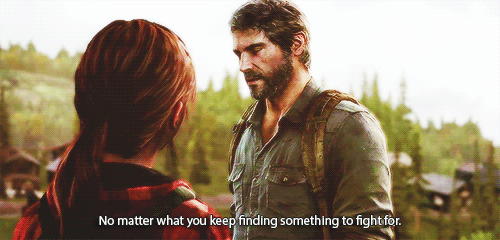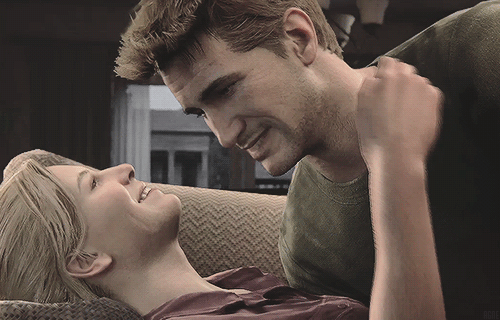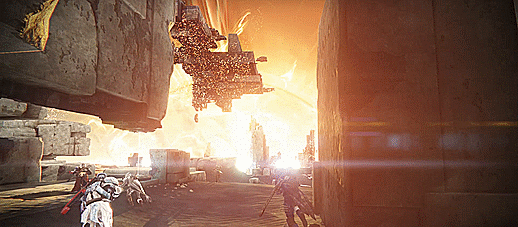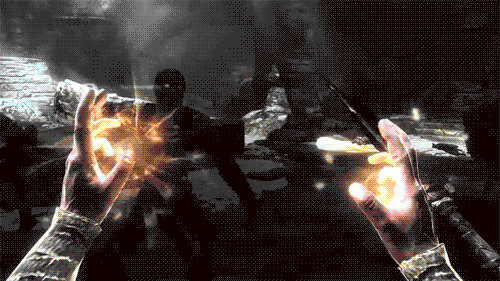Since I was around 11 years old, I have been immersed in a world of gaming.
My dad grew up as a gamer and to this day spends long hours at a time on his PlayStation 4; All of his friends and housemates were gamers. Even my grandmother regularly played World of Warcraft. Inevitably, I got older and picked up a controller as well. I didn't play particularly good game if we're honest, and I wasn't even good at the games I did play. But I enjoyed them superficially, seeing them no more deeply than I saw playing a board game- mindless fun, sure, but nothing overtly thought-provoking.
Recent years have shifted my focus in gaming however. As I grew as a gamer, the video game market grew with me, and I began to experience games like Legend of Zelda: Twilight Princess and Dragon Age: Origins- games that told a story that resonated with you in some way, or had characters that were real and somehow relatable. Over the years, I have begun to notice a serious trend in games that seek not to just serve as a form of escapism, but to relay some deeper emotion or lesson in truth that expands beyond the world of the game. Here are 6 of my favorite video games and the surprising lessons they taught me.
1. Never stop fighting for what (or who) you believe in. (The Last of Us)
Joel from The Last of Us is, admittedly, not the best person to take advice from, as he (played by you) kills hundreds if not thousands of hunters, infected, cannibals, and other undesirables in the course of the game. However, he has some traits to be admired and emulated. Joel begins the game losing his teenage daughter, and spends the next 20 years living a hopeless life as a scavenger in a US quarantine zone after a fungal virus has rendered most of the population as virtual zombies. In a strange sequence of events, he is tasked with escorting a sassy, if not occasionally bratty 14 year old orphan girl named Ellie across the country to a facility where she will be tested for a cure for the fungal infection. Joel is not fond of the idea, but because of a promise to a friend, he follows through.
What follows is the surprising and jarringly emotional journey of Joel slowly remembering what it's like to be a father, and Ellie gradually discovering what it's like to have a family. Despite such a bleak and harsh setting, there is such a tenderness between Joel and Ellie, and the way that they fiercely protect and care for each other in the face of of some truly horrific circumstances speaks volumes. The Last of Us does a fantastic job of reminding the player that the things that we really care about are worth fighting (and in Joel's case, killing) for, as well as showing that loss cannot and does not ultimately defeat our indomitable fighting spirit. We will always find that thing that truly, deeply matters to our soul and pour all our heart and passion into guarding it zealously the way that Joel and Ellie so zealously guard what they have found in each other.
2. Friends are one of your most valuable resources in life. (Journey)
Journey might be better described as an experience than as a game, but it is arguably one of the most emotional and beautiful experiences I have had while sitting in front of my console. As the name implies, Journey is the "story" of an unnamed, robed pilgrim in the desert journeying towards the lofty height of a faraway mountain. As the pilgrim makes his way, he encounters cloth creatures of all kinds, as well as various obstacles he must overcome to proceed closer to the mountain. The real art of the lesson of this game is how it is presented. Along the pilgrims way, he will meet other pilgrims- other online players- whom he may choose to travel with. Further, there is no dialogue, and the only form of communication between players is small chirps of music which, incidentally, often help keep each other alive.
Make no mistake, Journey may be played entirely alone, but to willfully do so misses a major point of the game. There are triumphant moments that need a companion to celebrate with. There are dark times where it's a comfort just to see another soul. There are the rough patches where a friend is needed to merely survive. In this way, Journey wordlessly yet perfectly illustrates the power and imperative of our friendships. Sadly, internet connections are sometimes lost, and players can lose a companion they spent much of the game with, leaving a pain not at all dissimilar to the loss or distance of our real friends. But even more like real life, the player brushes himself off, proceeds on his journey, and if luck has it, makes yet another fierce friend along his way who will see him through the deep descents back up to the Apotheosis- the top of the mountain.
3. Real love is never easy, but is always worth it. (Uncharted 4)
Much like Joel, Nathan Drake from the Uncharted series can be, for lack of a better word, troublesome. He is an everyman, an archaeologist, and a treasure hunter with a roguish charm we can't help but be drawn to. He goes where he wants, does what he wants, and women love him. Self-proclaimed descendant of explorer Sir Francis Drake, he skims the globe looking for lost cities, civilizations, treasures, and really pretty much anything historical and seemingly impossible to find. Enter Elena Fisher, a feisty and curious reporter who accompanies him on a dive to get a news story, and ends up getting swept into the pursuit of El Dorado, the city (or as Uncharted tells it, the statue) of gold. She proves herself pretty competent, even figuring things out that Drake cannot, while still being a kind, steady, compassionate voice of reason.
Over the first three games of the series, they form a relationship, but not without cost. Drake is problematically addicted to his lifestyle, a point of contention for him and Elena many times in the series, even causing them to separate after getting married and live on different continents for a while. While intrigued by the thrill of adventure, Elena sees the line that Nathan so recklessly crosses without concern for her or his other close friends. He even goes so far as to lie to her about where he is for weeks. And despite this, they make it work. This is not to say that their relationship is perfect, but they work at it, and it shows. They are both willing to admit their wrongs, work through the growing pains, be the bigger person, and make real change; and their marriage survives because of it. It's messy, and there are moments between them in the series that are truly heart-wrenching because they're real. The player can relate to these moments because, at their core, they are some of the same types of conflicts that stretched our own relationships to help them grow. While not every relationship will see the level of turmoil that Nate and Elena suffer, it is a fitting representation of how real, true love is not neat, clean or perfect, but again, is so worth the labor it demands. For Better or Worse.
4. There are fantastic, beautiful, and exciting things out in the world. You just have to go discover them. (Destiny)
Above most other genres, I am a RPG gamer. I am not a fan of first-person shooters, nor do I care for many MMOs. I find most FPS games tedious and repetitive, and I'm not competitive enough to care for Player vs. Player matches that come with many MMOs. However, after months of sitting beside my partner and watching him blast the heads off four-armed aliens and creatures covered in black trans-dimensional goo, I decided to give Destiny a chance, and I'm glad I did. What awaited me was an intriguing game world shrouded in mystery, threaded with deep lore, and littered with loot in the form of hundreds of unique guns and armor pieces, as well as collectible spaceships and vehicles called sparrows. Destiny's take on the semi post-apocalyptic science fiction game takes the player through the solar system with a sense of direction, rather than the mindless shoot-first-ask-questions-never attitude of many games in the FPS genre.
While there isn't a Witcher III-level intricate plot, Destiny gives a sense of purpose to the player, who plays as an unnamed character called a Guardian. Guardians, given life by the entity called The Traveler and, serve as humanity's last hope against 'The Darkness', the ominous enemy of the Traveler and of the small remnants of humanity. Your Guardian is a previously dead person or robotic given life by a Ghost, a mechanism created by the Traveler to create an army to protect itself and humanity. An interesting premise, for sure, but the real unique thing about Destiny is how the game can be played- any way you want. Bungie, the developer of Destiny, created huge, gorgeous environments for your Guardian to explore; a loot system of guns, armor and other collectibles to acquire through various missions, strikes, raids, patrols, quests, and PvP matches; and even 'Grimoire Cards' that uncover the murky and intriguing details of the world of Destiny. Everything in the game celebrates discovery and persistent work, from grinding in PvE Raids to get that really rare weapon to completing an insane sequence of jumps to recover the Grimoire Card of a dead Ghost. Destiny, in this way, is like life. There are beautiful places to see and fantastic things to discover in our world, but getting to experience life to its full requires patience, dedication, and the persistence to go out actually make it happen. The same way that an Exotic weapon doesn't just fall in your lap in Destiny, adventure does not knock on our front door as we shut ourselves away in our rooms. We must earnestly seek it.
5. There is no limit to what you can do. (Elder Scrolls)
Chances are, if you’ve heard of video games, you’ve heard of Skyrim. The fifth game of The Elder Scrolls (TES) series, it is considered one of the best games of our generation. It is a huge open world fantasy game that follows the trend of earlier games, allowing players total agency. Everything from race and gender to the weapons and skill trees your character uses are entirely the prerogative of the player. All Elder Scrolls games
begin in a similar fashion- with your character at the bottom of the heap (normally as a prisoner or slave). Your character has no weapons, armor, skills, or spells; they don't start out with any friends or associational ties or any health to speak of. From there, it is the player's job to direct the hero down whatever path they chose, and with a game that is several hundreds of hours long, those choices in paths are seemingly endless- One can be a mage, a thief, a warrior, an assassin. You can be a criminal, an upstanding citizen, a soldier. You can join mage guilds, engage in politics, get married, and even become a vampire.It should be fairly clear how Elder Scrolls is much like our real lives. We all, in a way, start from nothing. Granted, some of us may have certain advantages over each other like talent or money or intelligence; Elder Scrolls even has this in the form of racial and class bonuses. Yet we all enter this world with a myriad of opportunities open to us, and it's our choices that determine our path. Much like the Dragonborn of TES:Skyrim or the Hero of Kvatch in TES:Oblivion, we are the hero of our own stories. As such, the possibilities are wide open to us, and unlike in Elder Scrolls, there are no dragons or daedra or trolls to stand in our way- only ourselves.
6. Failure is only the end if you choose not to learn from it. (LIMBO)
Disclaimer: LIMBO is hard, and is arguably the one of the most darkly haunting games in my repertoire. Maybe I'm a terrible gamer, but it's probably the hardest game I've ever played, while being one of the simplest in premise and the most mysterious in interpretation. It's a 2D puzzle platformer in the likes of Mario games, but infinitely more difficult and depressing, with much more mentally engaging puzzles. While it's hard to say just what exactly LIMBO is about, the one concrete bit of information the developers gave players is that it is the story of a boy searching to find his sister. “Uncertain of his sister’s fate, a boy enters Limbo.”- the tagline is the only real clue that the developers released about the game. There are many theories about what the game is about, many of them rather dark, but that's not why LIMBO impacted me so much.
What really struck me is the way that players must proceed in the game. LIMBO is played by what the developers call "trial and death." That means what you probably can assume it means- you will die. A lot. Death is, morbidly enough, an integral part of the game, as well as an unavoidable one. Many of the puzzles are very dependent on the player's finesse and stringent timing, and acting just a moment out of proper timing can result in the little boy's immediate and gruesome death, whether by the giant spider or by falling into a bear trap. Failure in LIMBO is inevitable, so much so that there is even a trophy for completing the game with 5 deaths or less. And yet, that mechanic is what makes the game. Playdead, the developers of LIMBO, have made it clear that they intended to make a difficult game; they intended for players to fail. In this way, LIMBO jarred me. Many games on the market today require flawless skill and minimal error. Perfection is prestigious, and yet, LIMBO blatantly counters this logic. Failure is not something to be avoided, but embraced and learned from. LIMBO is much like life, where mistakes must be accepted and integrated into our perspective; They are inevitable, so just as the LIMBO player must learn what to do with deaths in-game, we must be able to step back and assess where we went wrong and where we need to go to move forward. Just like in LIMBO, failure is vital; it only means 'game over' if we refuse to use it.


























